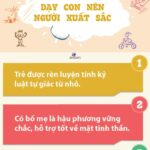The crow and the dove lived in a small forest. One day, the crow bid farewell to the dove, saying it was moving elsewhere.
The dove asked, “Why do you want to leave?”
The crow replied, “I don’t really want to move, but the people here don’t treat me kindly. They find my cawing annoying. I really can’t stay any longer.”
The dove thought for a while and then said to the crow, “Friend, if you don’t change the way you speak, no matter where you fly, no one will welcome you.” This is the famous Crow Law.
In family relationships, many parents like to impose their views on their children’s education, using general principles to adjust, but inadvertently creating a countereffect.
If parents can understand the “Crow Law” and make positive changes, educating their children will become easier.
When children have passion, inspiration, courage, and other noble strengths within them, they will overcome challenges and bond more with their family.
Educational expert Laura Markham states, “The rules of parenting are for parents, not children. First, parents must address their own issues, and then think about how to establish a connection.”
Based on the “Crow Law,” experts list three things parents can learn in the process of raising their children.

Illustration.

Holding Back the “Crow’s Mouth”: Limit the Attitude of Commanding Your Child
What most people usually like about crows is that they are very noisy. The cawing of crows makes the space more lively and creates a feeling of closeness to nature. However, this noise can also annoy people, especially when the space needs to be quiet.
In reality, many parents see something similar in their children’s eyes. They often complain when their children do something inappropriate.
Therefore, in this case, experts advise that parents should limit their complaints and blame. Constant criticism or judgment will make children feel pressured and afraid to express themselves.
Instead of focusing on what’s wrong, parents should encourage children to express their emotions and thoughts.

Limit the attitude of commanding your child.

The “Crow’s Heart”: Show Your Child Love
There’s a saying, “When parents give enough love, children will naturally feel grateful.” Children who grow up in a loving environment will become reliable. They understand the value of kindness and gratitude, thus forming positive relationships in life.
A child will not easily change unless they feel loved. Love is the solid foundation for their emotional development.
When children feel the warmth of their family, they can more easily accept themselves. Love gives them the motivation to explore the world without fear.
So, parents should pay more attention to their children’s psychological needs, do more and nag less, and let their children feel unconditional love.
This means that parents need to listen and understand their children’s emotions and thoughts, instead of just focusing on criticism or judgment. When parents take the time to communicate, children feel respected and accepted, making it easier to open up.
When emotional barriers are broken and love is felt, the heart softens and is ready to open up.
This connection helps children build trust, form communication skills, and develop the ability to establish positive social relationships.
Children will learn to express their emotions healthily and know how to handle complex issues.

“Crow Drinking Water”: See Your Child from a Different Perspective
The cawing of a crow is a flaw that makes it insecure.
But the crow also has its strengths. Anyone who has watched “The Crow Drinks Water” knows that crows can pick up stones and drop them into a jar to fill it with water.
So, in this case, parents are advised not to focus only on their children’s flaws but also to discover their strengths.

See your child from a different perspective.
Trying to discover the positive aspects of a child’s behavior can awaken their sense of worth, using their strengths to encourage changes in their flaws.
The child’s confidence will also be stimulated, prompting them to change and find a better version of themselves.
The purpose of parenting is not just to provide a comfortable life for children but also to instill love, resilience, and the ability to overcome difficulties.
When parents understand the workings of the “Crow Law,” they don’t force or impose but, instead, give their children enough love and freedom to stimulate their potential for better development and teach them how to build a happy and successful life in the future.
The 4 Creative Ways to Discipline Your Child That Are 100 Times More Effective Than Scolding
The art of reprimanding your child is an age-old dilemma for parents. This introduction paragraph aims to present a unique and effective approach to disciplining your child, one that is 100 times more effective than traditional scolding methods. Presenting four innovative strategies that will revolutionize how you address your child’s misbehavior and foster a more positive and respectful relationship.


































